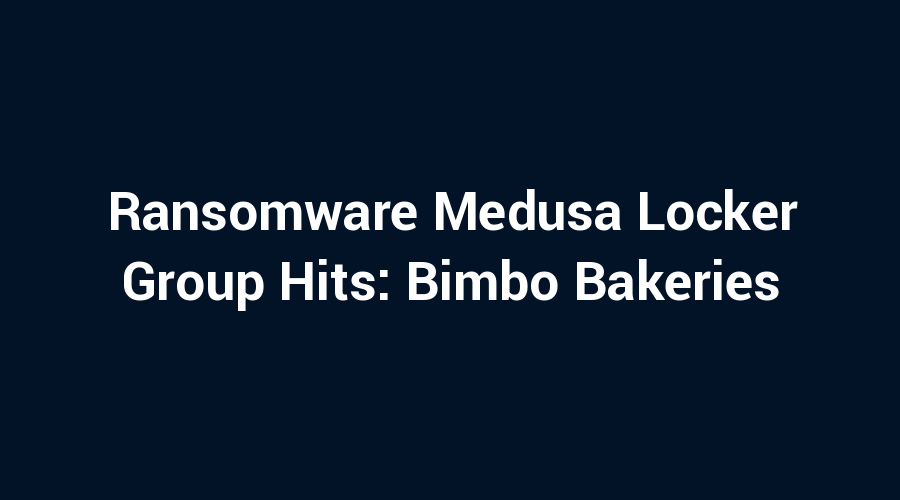The Infamous Ransomware Medusa Locker Group Hits: Bimbo Bakeries in a recent cyber attack, raising concerns about cybersecurity vulnerabilities. To stay ahead of emerging threats, fortify your online security with the HookPhish Dark Web Monitoring platform. Explore HookPhish Dark Web Monitoring.

| Victim Name | Bimbo Bakeries |
| Victim Description | Grupo Bimbo was founded in 1945. In 2002, the group was restructured and all companies were divided into four divisions: 1) Bimbo, S.A. unites the baking industry of Mexico and Central America; 2) Barcel, S.A. includes offices and sales in Botanas (small savory snacks) and Ricolino (chocolate); 3) Bimbo Bakeries USA (BBU) serves the US market; 4) Bimbo Canada serves the Canadian market 5) Organization Latinoamericana (OLA) serves the South American market. Grupo Bimbo has 105 enterprises in 18 countries in America, Europe and Asia. Their network is technically supported by DXC Technology, and network configuration was poor and vulnerable. |
| Price or Published Status | $ 6500000 |
| Post Date | 2024-02-17 16:45:46 |
| Number of Dark Web Post Views (at the time of scraping) | 391 |
The use of any indicators of compromise (IOCs) or information obtained through cybersecurity research for any purpose other than cybersecurity is not condoned by HookPhish. Any links or references to anything potentially sensitive are being shared for cybersecurity purposes only and are not intended to promote or facilitate any illegal activities. Always consider the potential legal and ethical implications of your actions utilising this information.
Medusa Ransomware Group
The ‘Medusa’ ransomware group has had a significant impact on businesses, targeting a wide range of industries, including high technology, education, manufacturing, healthcare, and nonprofit organizations. According to Palo Alto Networks Unit 42 researchers, the Medusa ransomware possibly impacted 74 organizations worldwide in 2023, primarily targeting Windows environments[1]. The group has been known to employ a multi-extortion strategy, pressuring victims by publishing sensitive data on their dedicated leak site, and providing them with multiple options, such as time extension, data deletion, or the download of all the data, each with a price tag[3]. The Medusa ransomware group has also been observed targeting vulnerabilities in Remote Desktop Protocol (RDP) to gain initial access to victims’ networks, and once inside, they encrypt the victim’s data and leave a ransom note with instructions on how victims can make a ransom payment[2][5]. The impact of these attacks has been far-reaching, with organizations across various sectors and geographic locations falling victim to the group’s activities. The Medusa ransomware is highly sophisticated, making it difficult to detect and stop, and its encryption algorithms are extremely challenging to break[2]. The group’s indiscriminate targeting emphasizes the universal threat posed by such ransomware actors[4].
Citations:
- [1] https://unit42.paloaltonetworks.com/medusa-ransomware-escalation-new-leak-site/
- [2] https://cyble.com/blog/unmasking-medusalocker-ransomware/
- [3] https://thehackernews.com/2024/01/medusa-ransomware-on-rise-from-data.html
- [4] https://therecord.media/water-for-people-medusa-ransomware
- [5] https://cybersecuritydive.com/news/fbi-cisa-medusalocker-ransomware/626483/
Disclaimer: HookPhish does not engage in the exfiltration, downloading, taking, hosting, viewing, reposting, or disclosure of any files or stolen information. Any legal concerns regarding the content should be directed at the attackers, not HookPhish. This blog is dedicated to posting editorial news, alerting readers about companies falling victim to ransomware attacks. HookPhish has no affiliation with ransomware threat actors or groups, and it does not host infringing content. The information on this page is automatically generated and redacted, sourced directly from the Onion Dark Web Tor Blogs pages.

